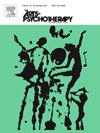A study exploring dance/movement therapy's affinity with the body training system by Lee-chen Lin in Taiwan: A focus on self-concept
IF 1.5
3区 心理学
Q3 PSYCHOLOGY, CLINICAL
引用次数: 0
Abstract
This study explores the compatibility of Dance/Movement Therapy (DMT) with the Body Training System (BTS) developed by choreographer Lee-chen Lin, born in Taiwan, emphasizing the interconnectedness of body, mind, and self-exploration. The study identifies key affinities between Lin's BTS and DMT through a literature review, particularly in their shared focus on somatic awareness, emotional regulation, and the relationship between the self and others. The findings suggest that, while cultural interpretations of self-concept exist between Eastern and Western contexts, the need for self-exploration through bodily experience is universal. This study contributes to a deeper understanding of the role of body philosophy in mental health and highlights the potential for integrating culturally unique practices into DMT, thereby expanding therapeutic approaches in diverse cultural settings. Future research should foster a cross-cultural dialogue on well-being and mental health interventions.
台湾林丽珍研究舞蹈/动作疗法与身体训练系统的亲缘关系:以自我概念为焦点
本研究探讨舞蹈/动作疗法(DMT)与台湾编舞家林丽珍所开发的身体训练系统(BTS)的相容性,强调身体、心灵与自我探索的相互联系。该研究通过文献综述确定了Lin的BTS和DMT之间的关键相似之处,特别是它们都关注躯体意识,情绪调节以及自我与他人之间的关系。研究结果表明,虽然对自我概念的文化解释存在于东方和西方语境中,但通过身体体验进行自我探索的需求是普遍的。这项研究有助于更深入地了解身体哲学在心理健康中的作用,并强调将文化独特的实践融入DMT的潜力,从而扩大在不同文化背景下的治疗方法。未来的研究应促进福祉和心理健康干预的跨文化对话。
本文章由计算机程序翻译,如有差异,请以英文原文为准。
求助全文
约1分钟内获得全文
求助全文
来源期刊

Arts in Psychotherapy
Multiple-
CiteScore
3.20
自引率
11.10%
发文量
66
期刊介绍:
The Arts in Psychotherapy is a dynamic, contemporary journal publishing evidence-based research, expert opinion, theoretical positions, and case material on a wide range of topics intersecting the fields of mental health and creative arts therapies. It is an international peer-reviewed journal publishing 5 issues annually. Papers are welcomed from researchers and practitioners in the fields of art, dance/movement, drama, music, and poetry psychotherapy, as well as expressive and creative arts therapy, neuroscience, psychiatry, education, allied health, and psychology that aim to engage high level theoretical concepts with the rigor of professional practice. The journal welcomes contributions that present new and emergent knowledge about the role of the arts in healthcare, and engage a critical discourse relevant to an international readership that can inform the development of new services and the refinement of existing policies and practices. There is no restriction on research methods and review papers are welcome. From time to time the journal publishes special issues on topics warranting a distinctive focus relevant to the stated goals and scope of the publication.
 求助内容:
求助内容: 应助结果提醒方式:
应助结果提醒方式:


